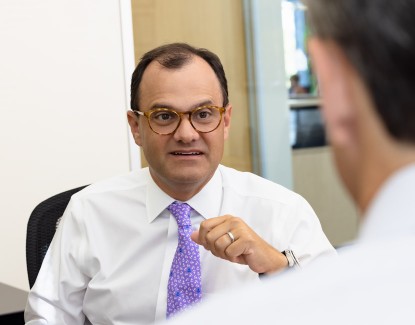Portfolio Update: Results Recap and Investment Outlook
In this letter we share some thoughts from the Portfolio Managers at Broad Run Investment Management, LLC, the Fund’s sub-advisor.
-
 David Rainey, CFACo-Portfolio Manager
David Rainey, CFACo-Portfolio Manager -
 Brian Macauley, CFACo-Portfolio Manager
Brian Macauley, CFACo-Portfolio Manager -
 Ira Rothberg, CFACo-Portfolio Manager
Ira Rothberg, CFACo-Portfolio Manager
Commentary
Leading economic news in the first quarter included the dramatic collapse of Silicon Valley Bank and Signature Bank, and the fire sale of Credit Suisse. While these banks took the ignoble headlines, their struggles drew attention to the broader stresses in the banking system caused by the rapid rise in interest rates over the last year and a half.
Financials compose about 34% of our portfolio, but we do not own any banks or have any direct exposure to this banking crisis. Our businesses categorized as financials include Aon (an insurance broker), Brookfield (an investment manager), Markel (a specialty insurer), and Encore (a debt collector). They are highly differentiated from each other in both their business models and our investment theses, and are not exposed to the same asset-liability duration mismatch as the banking industry. They each have varying sensitivity to the credit cycle and capital markets, but nothing so tied to the banks that it warrants a callout in this letter.
Surveying our broader portfolio, there is just one business that stands out as likely impacted by this banking crisis – Ashtead Group (about 8% of assets). Roughly 40% of Ashtead’s revenue comes from renting equipment to contractors working on non-residential construction projects. Banks are the primary lenders for these projects, so future projects (those that are a year or two out from breaking ground, given construction lead times) are at risk if bank lending is more restrictive. Reflecting on the state of the credit environment, we have tempered our expectations for non-residential construction activity in 2024 and 2025, and modified our expectations for Ashtead accordingly.
Non-residential construction is cyclical. In isolation, we would expect higher interest rates and tighter credit conditions to trigger a normal non-residential construction recession. However, we have recently experienced abnormal government largess; the CARES Act, the CHIPS Act, and the Inflation Reduction Act are rolling out and will provide a major tailwind to non-residential construction over the remainder of the decade. In addition, entirely new categories of demand have emerged with post-COVID supply chain nearshoring projects and large-scale long-duration decarbonization projects (such as EV battery plants, solar and wind farms, and transmission lines) providing a boost that may be enough to avoid a non-residential construction contraction.
Ashtead is a business firing on all cylinders. In its most recently reported quarter (announced March 7th) it reported revenue up 23% and earnings per share (EPS) up 30%, and raised guidance for its fiscal year. Over the last five years, Ashtead has posted annualized revenue growth and EPS growth of about 14% and 17%, respectively. This compares to annualized non-residential construction industry growth of about 5% over the same time period. Ashtead is outgrowing the non-residential construction industry—powered by a secular share shift from equipment ownership to equipment rental, same-store market share gains, new store openings, tuck-in acquisitions, rising rental prices, and product expansion into specialty categories.
With these numerous revenue drivers, our expectation is that Ashtead could grow through a mild or even moderate non-residential construction recession. In a severe downturn, which we do not expect, Ashtead would likely see a temporary decline in sales and earnings. However, with the best balance sheet, business model, and management team in the industry, we would also expect to see a period of supercharged market share gains as the company outcompetes and acquires distressed competitors as it did in the global financial crisis (GFC).
Looking at the bigger picture, Ashtead remains one of our highest conviction long-term investments. From about 12% market share today, we are confident the company will reach 25% plus market share over time by simply continuing to use the same strategy it has successfully employed over the last decade. With a highly fragmented industry, clear scale advantages, superior service offering, and 30% mid-cycle return on equity (ROE), we expect Ashtead’s EPS to compound at a high-teens rate over the next decade, or longer.
Ashtead’s stock is down about 20% since the banks took over the headlines in March. The recent developments in the banking industry and the resulting tighter credit environment are incremental negatives for the company in the short- to intermediate-term. But with our long-term investment horizon, this is just one of those unavoidable bumps along the road in the value creation journey. We think that the recent stock price decline more than compensates for the risk of a downturn. From today’s modest starting valuation of 13.4x next 12 months (NTM) price-earnings (6.9x NTM EV/EBITDA), we expect a 15-20% rate of compounding in our investment over the next decade, inclusive of an industry downturn or two along the way.
Cogent Communications
During the quarter we added to our Cogent position, increasing it to about 3% of assets. Since our last update in our Q4’22 letter, published in late January, we have continued to follow Cogent closely and deepen our understanding of the business. Our recent research has included additional conversations with management, participation in recent company conference presentations, speaking with more current and former Cogent customers, and speaking with another buy-side investor knowledgeable about the business.
New revelations and learnings have been almost universally positive, including:
• The Sprint acquisition is on pace to close in Q2’23 rather than Q4’23, nearly 6 months ahead of our initial expectations.
• Wavelength sales have already begun under a licensing arrangement with T-Mobile/Sprint. While not financially material, this early start will enable Cogent’s sales force to build familiarity with the offering and generate some early bookings prior to the closing of the transaction.
• The company now believes that it can get the legacy Sprint corporate business up to a 20% EBITDA margin over time, rather than the 10% margin target management initially shared.
• We believe dark fiber is likely to be a $50M plus run-rate revenue business in several years’ time, at 90% plus gross margins. In addition, we believe Sprint data center assets can eventually be ramped to about $30 million of revenue and $15 million of EBITDA. Neither of these opportunities was explicitly included in our original underwriting.
We have updated our model to reflect these developments, which has increased our expected internal rate of returns (IRRs) and increased our conviction in a favorable long-term investment outcome.
Allegiant Travel
Finally, we sold the remainder of our Allegiant Travel position during the quarter to help fund the additional purchase of Cogent.
We purchased Allegiant in the summer of 2020 in the midst of the pandemic lockdowns. Our thesis was that Allegiant was a fundamentally good airline business that would recover quickly as vaccines became widely available and leisure travel rebounded. In addition, we believed there was attractive growth opportunity beyond the rebound as Allegiant continued to roll out its high return business model to additional U.S. markets.
While we were generally right about the rebound in leisure air travel, we failed to anticipate that a slow rebound in business travel would leave other airlines with excess capacity that would be directed to the leisure market, creating oversupply. In addition, the unanticipated surge in inflation beginning in 2021 made it hard to raise prices without destroying demand from Allegiant’s price-sensitive customers. Earnings never rebounded to the extent we expected, and with significant additional inflationary costs on the horizon (new union contracts), we determined that we had better, higher conviction uses for this investment capital.
Click here for a full listing of Holdings.
Click here for full, standardized Fund performance.
- In this article:
- Domestic Equity
- Focus Fund
You might also like
-
 Portfolio Perspective
Portfolio Perspective
Cornerstone Large Growth FundHigh Profitability and Attractive Valuations – A Compelling Combination
 Neil J. HennessyChief Market Strategist and Portfolio Manager
Neil J. HennessyChief Market Strategist and Portfolio Manager Ryan C. Kelley, CFAChief Investment Officer and Portfolio Manager
Ryan C. Kelley, CFAChief Investment Officer and Portfolio Manager L. Joshua Wein, CAIAPortfolio ManagerRead the Commentary
L. Joshua Wein, CAIAPortfolio ManagerRead the CommentaryIn the following commentary, the Portfolio Managers of the Hennessy Cornerstone Large Growth Fund discuss the Fund’s formula-based investment process and how it drives the Fund’s sector and industry positioning.
-
 Portfolio Perspective
Portfolio Perspective
Cornerstone Value FundDriven by Revenues, Cash Flow, and High Dividend Yields
 Neil J. HennessyChief Market Strategist and Portfolio Manager
Neil J. HennessyChief Market Strategist and Portfolio Manager Ryan C. Kelley, CFAChief Investment Officer and Portfolio Manager
Ryan C. Kelley, CFAChief Investment Officer and Portfolio Manager L. Joshua Wein, CAIAPortfolio ManagerRead the Commentary
L. Joshua Wein, CAIAPortfolio ManagerRead the CommentaryIn the following commentary, the Portfolio Managers of the Hennessy Cornerstone Value Fund discuss the Fund’s formula-based investment strategy and how it drives the Fund’s sector and industry positioning.
-
 Portfolio Perspective
Portfolio Perspective
Focus FundLong-term Investing in a Concentrated Collection of Businesses
 David Rainey, CFACo-Portfolio Manager
David Rainey, CFACo-Portfolio Manager Ira Rothberg, CFACo-Portfolio Manager
Ira Rothberg, CFACo-Portfolio Manager Brian Macauley, CFACo-Portfolio ManagerRead the Commentary
Brian Macauley, CFACo-Portfolio ManagerRead the CommentaryIn the following commentary, the Portfolio Managers of the Hennessy Focus Fund summarize the 2024 market and provide their insights on their 2025 outlook, including the impact on holdings from presidential administration’s policy changes and the growth of AI.
